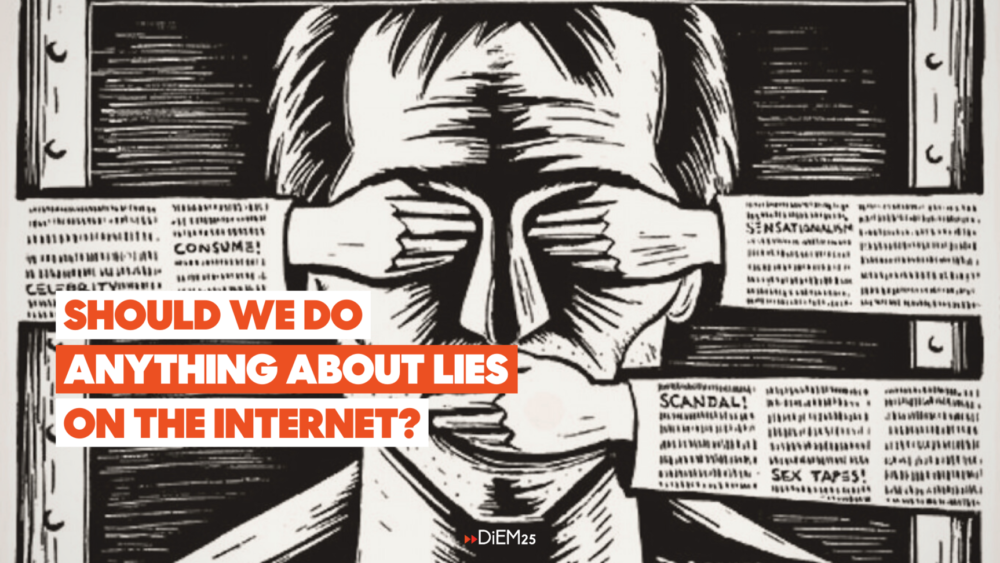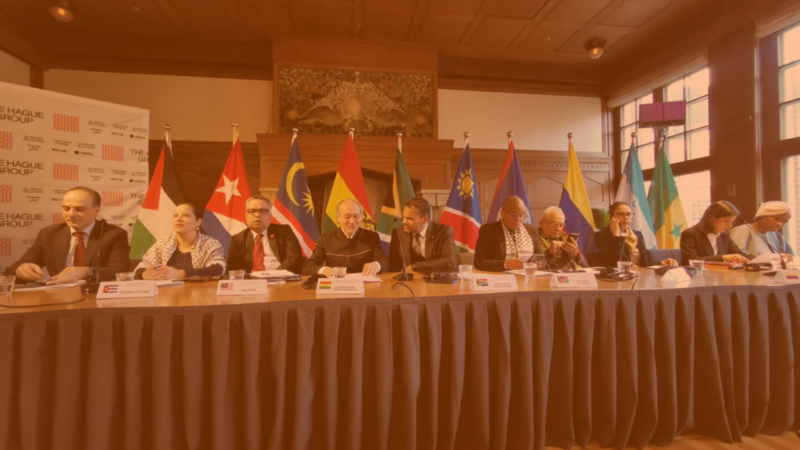Misinformation, disinformation, propaganda, scams. Whatever their intention, they amount to the same thing: lies. And since anyone can now be a publisher, and everyone has a device in their pocket, the Internet has accelerated their propagation – to warp speed.
COVID isn’t spread by 5G. Our planet is not a single infinite plane. There was no pedophile ring working out of the basement of a Washington pizzeria.
And while we may snigger at some of these conspiracy theories, online lies can harm, too. As the massacre of Myanmar’s Rohingya people has tragically shown.
The Establishment response towards people who share these views is usually to call them out, to shame and cancel them. And if necessary, to shut them down outright.
And it works, doesn’t it? It makes the Wild West of the internet a little less wild.

Uh, no
There are several problems with this picture.
The Establishment is the worst offender
The most dangerous lies come not from conspiracy peddlers, but the Establishment itself. There were no weapons of mass destruction in Iraq. The Afghanistan war was going terribly, even when the invaders said otherwise. The economic crisis in Greece didn’t happen because its people were lazy and corrupt. And the Russian government did not collude with Donald Trump to win the 2016 US election for him (a largely uncorrected story, paving the way for another war in Ukraine as I type).
Or let’s take our present pandemic. Health authorities said in March 2020 that masks were unnecessary – then backtracked and admitted having made the first statement to preserve masks for hospitals. They’ve changed positions on the issues of herd immunity and vaccine side effects like myocarditis, as well as school openings and lockdowns.
And here’s Joe Biden last July on whether vaccines prevent COVID spread, a ‘fact’ that was quickly disproved:
You’re not going to get COVID if you have these vaccinations.
Perhaps you think pushing people to get vaccinated, sometimes using outright lies, is what a government should do in a pandemic. (I don’t – I think they should level with us, always.) And yes, science is a process and experts get it wrong.
But imagine how many damaging conspiracy theories these turnarounds give oxygen to. Each time authorities get caught fibbing, trust is further shattered. People ask the Very Reasonable Question: if they lied to me about that, what else are they lying about?
The accusation of spreading lies is itself a weapon
There are also powerful incentives for people to label views as ‘harmful’ and call for them to be silenced. When those views just contradict their own. And since we are all publishers today, anyone can wield this weapon. We must always factor this into our calculations of whether to believe them.
This week I’ve seen two examples that illustrate this. A pressure campaign led by legacy media against the Substack platform (which has attracted many heterodox journalists), and one against the world’s most popular podcaster, Joe Rogan, are both in the headlines. Substack and Rogan are major voices challenging Establishment orthodoxy. And in both cases, these campaigns claim that Substackers and Rogan spread ‘disinformation’ by sharing contrarian views on COVID.
Why would legacy media outlets do this? Since, we can’t read people’s minds to understand their motivations, we could of course assume that legacy media is acting in good faith. That they’re trying to protect the public from harm.
But it’s important to consider the context, too. Substack has provided a home, an audience and an income for many journalists. Particularly those who fled legacy media after claiming their views had been stifled or censored. And in the case of Rogan, this chart says it all:

Legacy media’s business models have been decimated by platforms like Facebook and no longer trusted by the public. They are locked in a fight for their lives. They need to stay relevant, and they want their gatekeeper status back. It’s plausible that instead of trying to innovate, they’d rather take out the competition by accusing them of creating online harm.
The lies might not be as dangerous as claimed
The perceived damage caused by lies from ‘bad actors’ is often inflated.
The idea that a given lie can create harm seems to rest on an assumption: that in general, people can’t distinguish online fact from fiction and are suckered into believing untruths. My unscientific view is that this is BS.
OK, in every debate there are people at the extremes with pseudo-religious beliefs that favour their side. They will never be convinced.
But we should focus on what we can influence, and that means the vast middle – those who can be persuaded either way. True, humans today are operating in a polluted information environment, with faulty mental machinery and biases. It’s the Wild West, after all.
But even so, I believe that people are not idiots and can make up their minds for themselves. Tens of millions, and probably many more, saw through the Establishment’s WMD ‘evidence’ (even if it still resulted in war and occupation). And I struggle to accept that millions are taking medical advice from one of Joe Rogan’s guests – especially when he has debated many pro-Establishment voices on the same show.
But what about those times when someone’s misinformation or hate speech can harm? Sure, there are cases where incitement to harm is so obvious that there’s little room for interpretation. And in some of those cases, it could be justified to censor those views. But it is not a call to be made lightly.
Censorship is a blunt and ineffective instrument
The remedial action — censorship — rarely achieves its stated goal. Because outlawing content makes it more attractive. But also because the architecture of the internet makes banning views impossible in practice.
And censors will always be playing catch-up. As technology like Deepfakes evolves, lies that look real become trivial to manufacture. Just wait for the next major election to see.
Of even more concern, though, is this: who decides which views should be banned? The answer is usually some unelected Silicon Valley billionaires. It’s legal for Twitter’s CEO to kick politicians off Twitter. But it’s neither ethical, nor politically helpful.
Censorship breeds monsters
The Establishment’s censoriousness makes a profound mess of our discourse. Humans evolve through the free expression and collision of ideas — especially those we dislike. Science is a process that depends on this.
Censorship threatens the marketplace of ideas and stifles debates we need to have – especially in a pandemic. It narrows the bands of what is permitted to express, while coercing would-be dissidents to self-censor out of fear. It exacerbates divisions. And it sets the scene for demagogues to swoop in and seize power.
All this is the strict-father model in practice. It’s the Establishment fearing loss of control, demanding Compliance At Any Cost as it backfires royally. While pushing its own lies, again and again and again.

So what the hell should we do?
Activists are adept media consumers and we’re in the middle of this mess. Here are some suggestions of how to get through it:
See the landscape clearly
Much of the internet has become a firestorm of competing agendas, tribal warfare, platforms stoking rage and division, and people trying to sell shit to us. So each time you log in to the Wild West, be on your guard. With your hand near your holster.
Stay skeptical, stay sane
Whether you’re reading The Guardian or an obscure Facebook group, balance your reading with arguments from the other side. Follow people you disagree with. See expert views as inputs, not as answers. Be open and curious to have your mind changed.
And get around Twitter’s algorithms by using apps like Tweetbot. Throw other platforms out. (Facebook, in particular, is very hard to out-game.)
Instead of crying to the ref, play better
You’ve seen someone pushing misinformation or hate speech? Push back against the views, not the person. Instead of trying to silence them, meet their ideas head on with a narrative of your own. This is the essence of persuasion. Whether you’re debating on a forum, or battling a coordinated Establishment media campaign as we did with Omikron Project. (Unless, of course, you’re dealing with a direct incitement of violence. But set the bar high for that, because boy is it low these days.)
Don’t join in the firestorm
Comment on what you have a proposal for resolving, or where you think you can add value to the debate. Don’t comment on an article based on the headline, or immediately after reading. Give yourself space, digest, and comment once you have something that can add value to the debate — if at all.
The author is an adviser to DiEM25’s Coordinating Collective. A version of this article first appeared in the activist newsletter, Subvrt.
Do you want to be informed of DiEM25's actions? Sign up here















